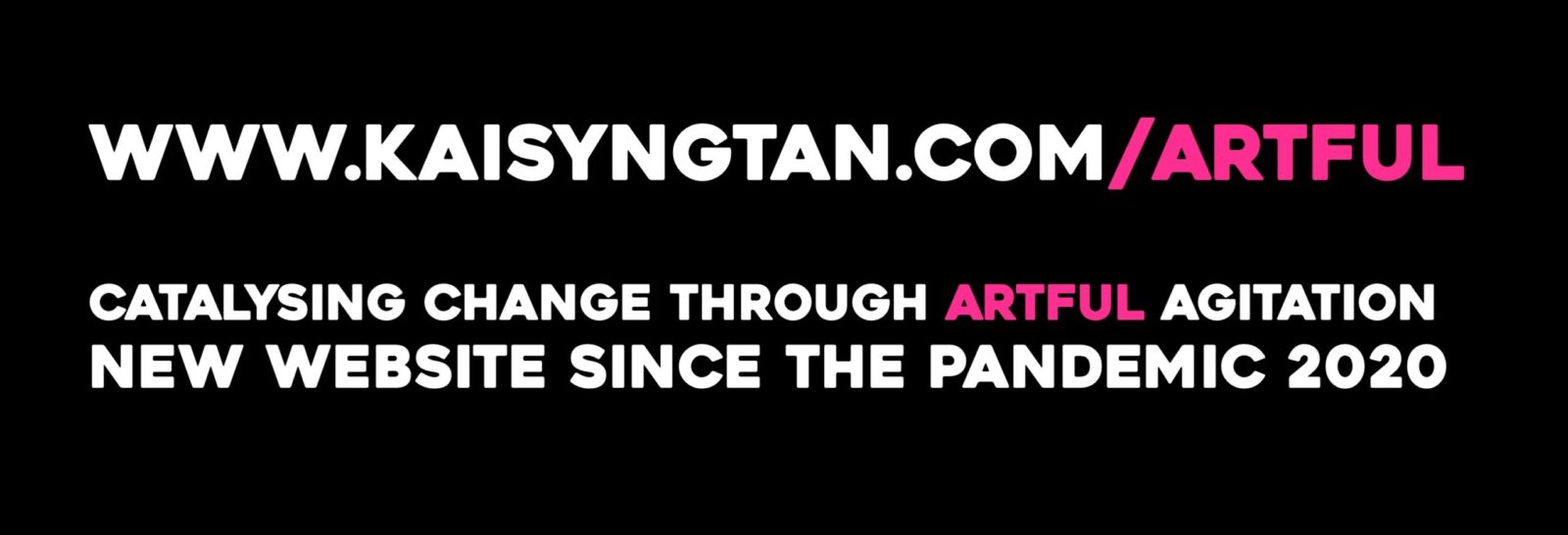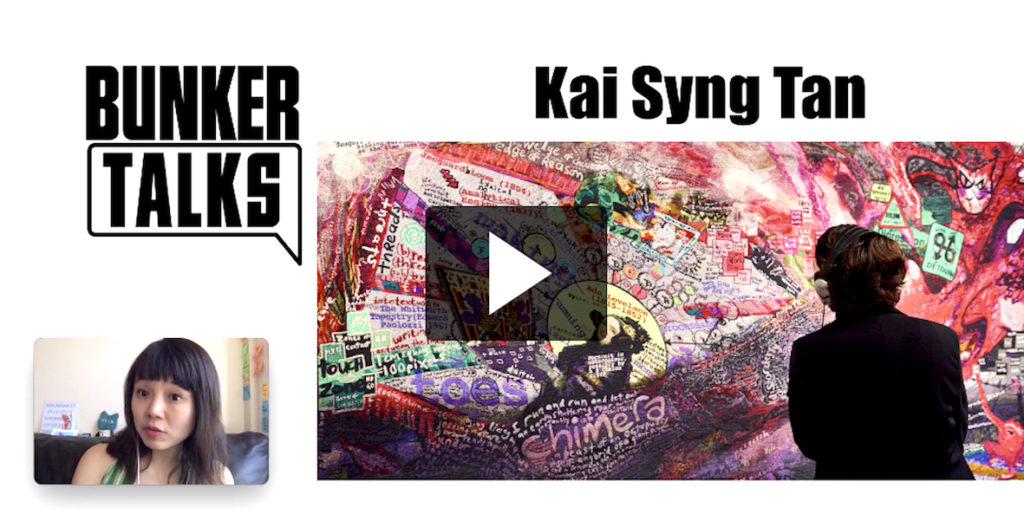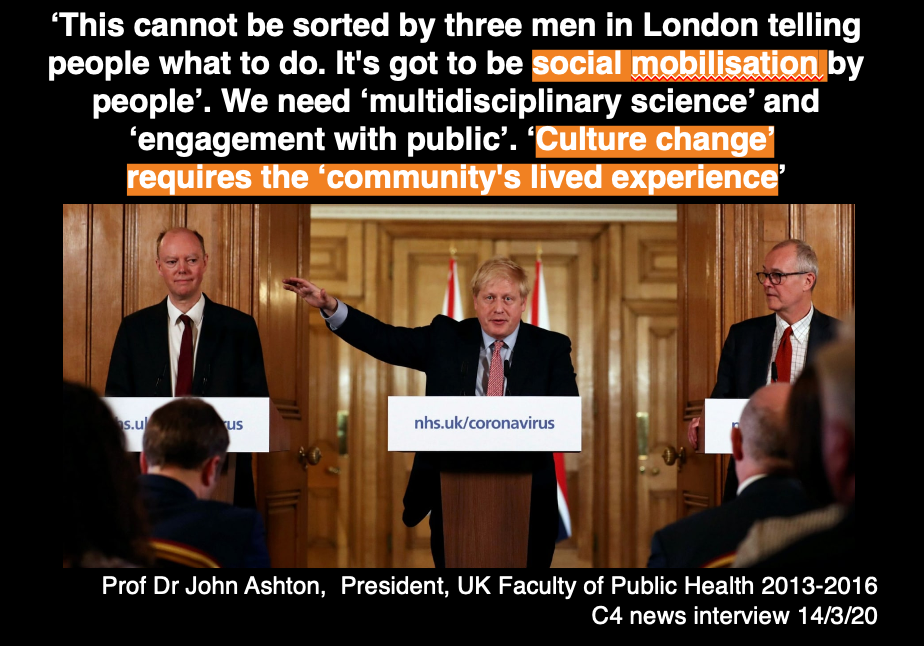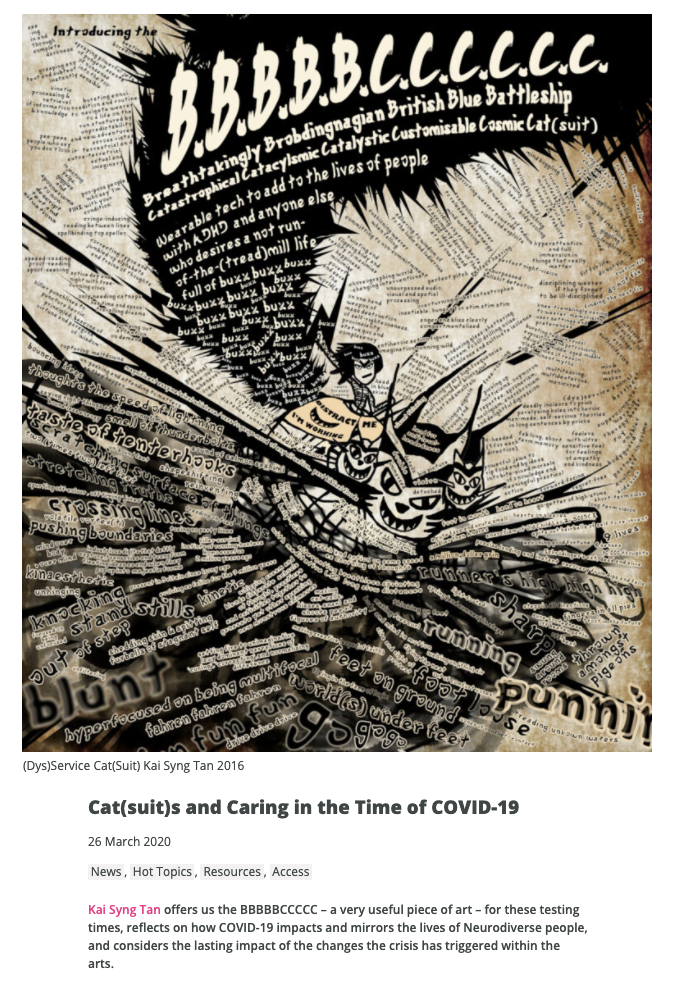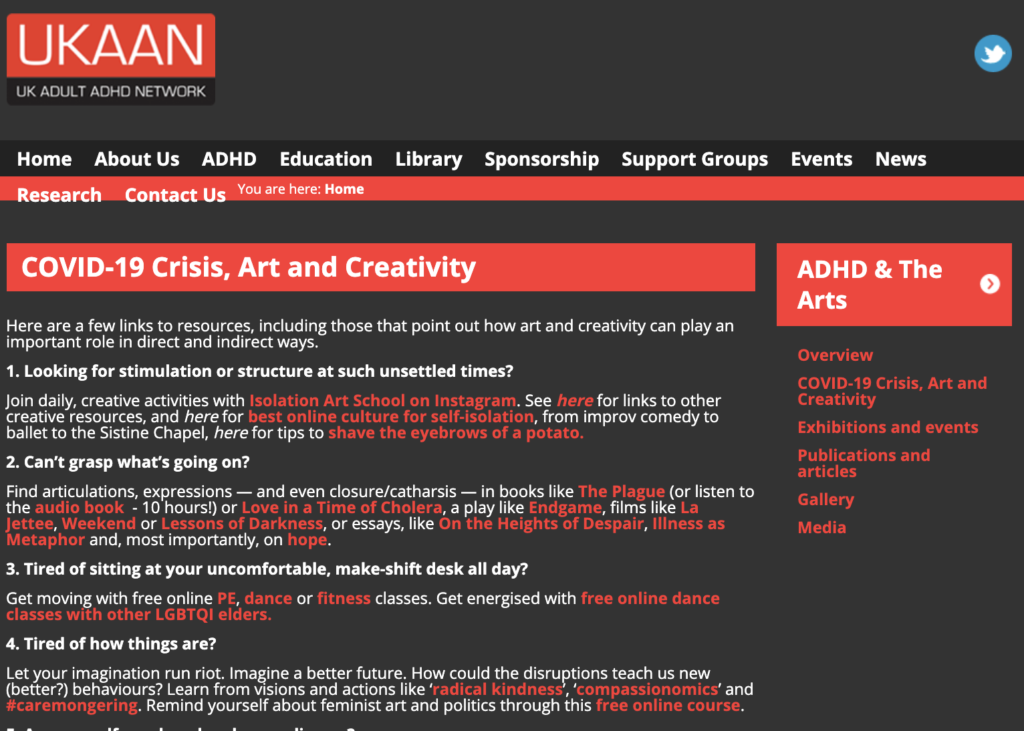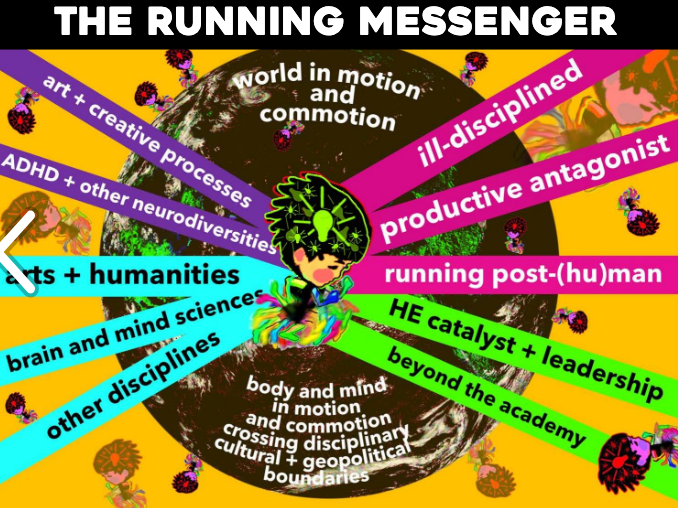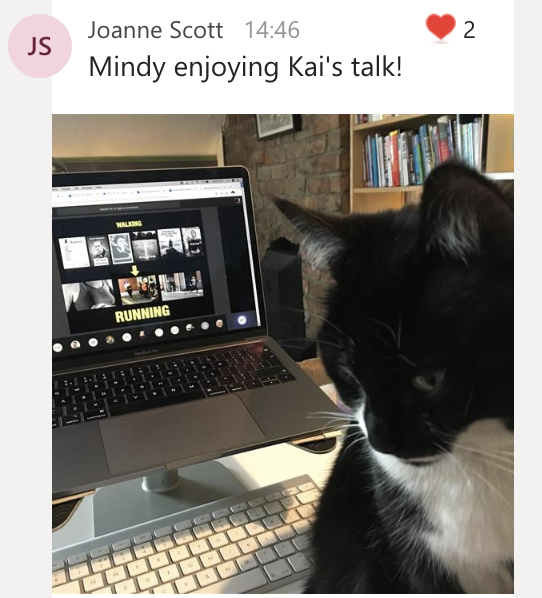**See new website Catalysing Change through Artful Agitation, created as a response to COVID-19, here. **
The COVID-19 pandemic will fundamentally change what/how/who we are forever. Or will it? Will, as Steven Pinker argues, human beings simply revert to our old ways? Is any of this nature’s ‘clear warning shot’, and has ‘burst our bubble‘, or, when we emerge from this, will we party/fly/ spend/hurt/ bully with a vengeance, and return to our toxic ways for, that is our real, primal nature? And clearly, the virus isn’t the enemy – we are. This disaster is human-made. We have been complacent, arrogant, ignoring feedback from nature, advice from experts and scapegoating them, disregarding what our bodies and minds are telling us. So, what can art, creativity and neurodiversity do in the midst of any of this? What new insights and visions can we offer? The following are some of my live solo/collaborative readings, responses and efforts. They include materials for an online performance-lecture for EU scientists, and my offering of a chonky Battle Cat for those struggling with social distancing, and other ‘artful‘ approaches. These contribute to emerging frameworks, visions and actions like ‘radical kindness’, ‘compassionomics’ and #caremongering, which run alongside other efforts that many of us may also/already be doing on the ground (please rally behind the NHS to have access to PPE for staff, donate to the Guardian for its no-paywall, in-depth coverages and the Pankhurst Trust which protects women from possible augmented domestic violence during this time). Key in this discussion is art and creativity, because art and creativity is survival (why else did cave people make drawings, as my friend James Steventon, Director of Fermynwoods Contemporary Arts, asks) and, as Bob and Roberta Smith states, a human right. It is precisely when resources are scarce, when we are fearful, that art can and should open up platforms for dialogues, playing on its ambiguity and complexity to provoke new insights and questions. Do get in touch if I can help in any way, or if. keen to chat. Let’s use the crisis as a catalyst for change for the better. Take care every body. Best wishes, Kai
Click to watch this interview (40 minutes) rehearsing the beginnings of the paradigm of ‘artful leadership’. Interviewer: Dr Michael Pinchbeck 22 April 2020, through his Bunker Talks.
2. Ten Reasons to Collaborate with Neurodiverse & Creative Allies (17/03/2020 Lecture + Masterclass for EU-funded consortium of scientists)
- On the criticality for scientists to work with creative & neurodiverse allies. Lecture & Masterclass commissioned for the 2020 CoCA Annual Meeting. scheduled for 17/3/2020 at Frankfurt University Hospital. Watch recorded video clip of presentation here. Read transcript here. See slideshow here.
- Commissioned for the 2020 CoCA Annual Meeting. CoCA (Comorbid Conditions of ADHD) is a world-leading EU Horizon 2020 funded (50m Euro) consortium that studies the comorbidity between the most frequent psychiatric conditions relating to ADHD. The highly multi- and interdisciplinary consortium comprises 17 partners from 8 European countries (Germany, Netherlands, UK, Estonia, Norway, Spain, Sweden, and Denmark) and the US. The partners have expertise in child, adolescent and adult psychiatry and in-depth knowledge on clinical studies, exercise, the circadian system, experimental medicine, mobile health applications, public health interventions, data integration, statistics, bioinformatics, genetics, machine learning, and epidemiology.
3. Cat(suit)s & Caring In The Time of COVID-19 (26/3/2020 commissioned blog post for Unlimited)
- In this post, I do my bit for #caremongering by sharing my Cat(suit), which is an incredibly useful work of art, for these testing times.
- You’re welcome.
4) Sharing & Learning with the new Neurodiversity In/And Creative Research Network (since 02/2020)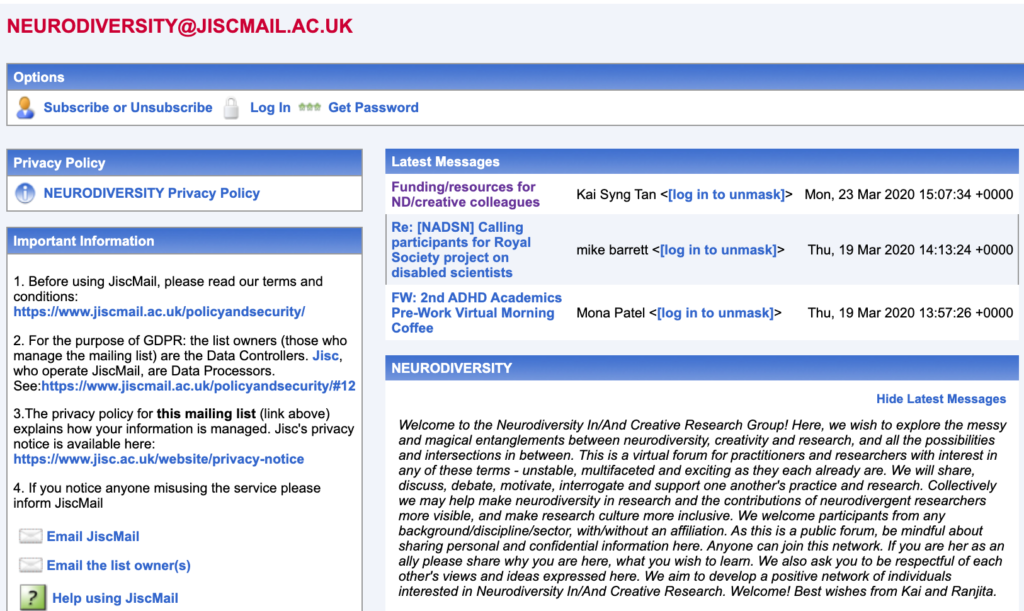
- Everybody is trying adjust to the disruption and chaos. For neurodiverse colleagues there are additional challenges. At this new network, as we learn about one another’s work/interests/aims, some also try to share ways to cope and make something positive from the crisis (who’s up for a fun Craftiness Against COVID-19 haiku contest that also supports emerging colleagues?). We have started online meetings. We began with a keynote and a live online advice support by member Professor of Psychiatry Philip Asherson, and next up are discussions around workplace cultures and diverse practices (including during the current disruptions), identities (disclosure), and keynotes/masterclasses/workshops/provocations by members exploring ‘neuroaesthetics’, trying out new ideas and so on.
- The Neurodiversity In/And Creative Research Network is a virtual expanded hub that I co-founded and co-lead with a lecturer in pharmacy and Leverhulme Fellow Dr Ranjita Dhital from Reading University. It brings together practitioners and researchers from diverse sectors worldwide, who share their knowledges, critical inquiries and local efforts. Now with 129 members since its set up in February, members are from technology, neuroscience, psychiatry, theatre, health, dance, media art, equality and diversity, disability and work in diverse sectors including cultural like museums and galleries, and higher education. We’re from London, Taiwan, Victoria/Australia, British Columbia/ Canada, Netherlands and Exeter, Glasgow, Portsmouth. Many are neurodiverse, many are allies, curious and/or want to work with and learn.
- –> What is neurodiversity? Although the term is increasingly used/appropriated (not least by World Economic Forum and Nesta et al as a strategy in the face of technological upheaval), ‘neurodiversity’ remains a complex and contested – and hence exciting – term and framework. It can be understood as something that applies to people with dyslexia, ADHD, autistic spectrum, and those with overlapping/co-occurring differences. Like the concept of biodiversity, neurodiversity has been argued to be ‘a next step in a more respectful way of thinking about our planet and our communities’, a ‘more humane and accurate lens’ to understand who we are (Baron-Cohen 2017).
5) UK Adult ADHD Network (UKAAN) advice: MENTAL HEALTH, CRISIS, ART & CREATIVITY (04/2020)
- UK Adult ADHD Network is a network for professionals and researchers in mental health.
- As UKAAN Creative and Cultural Consultant, I put together a few resources, including those that point out how art and creativity can play an important role in direct and indirect ways, as well as for people who may be in the creative sectors and are affected by the disruptions. Take a look here.
- Let me know if you have other resources to share!
6) Guest lecture on learning through making 08/05/2020
These are slides from a talk that I will give, invited by the generous Dr Chrissi Nerantzi, who pioneered #CreativeHE amongst other innovative learning and teaching frameworks.
7) Running Artfully Across Disciplines (23/3/2020 Workshop for medical from St Georges Hospital and medical humanities students from Birkbeck)
- This has a similar message to the Frankfurt lecture, albeit from another strand of research and body of work, around running as a creative discourse. See slideshow here.
- Invitation by artist Dr Deborah Padfield. Co-taught with Professor Annie Bartlett, and Prof Jo Winning of Birkbeck.
- Inspired by Rousseau’s seminal 1776 book Reveries of the Solitary Walker, the performance-lecture is structured around 10 runs, and draws on a keynote lecture at Paris School of Culture and Arts for the RUN! RUN! RUN! Biennale 2018 and a book chapter for the Mobilities Handbook (Edward Elgar) ed by Monika Büscher (Centre for Mobility Research, Lancaster Uni), Malene Freudendal-Pedersen (Roskilde Uni/Denmark) and Sven Kesselring (Nuertingen-Geislingen Uni).
8. Craft & Design Centre Solo Exhibition
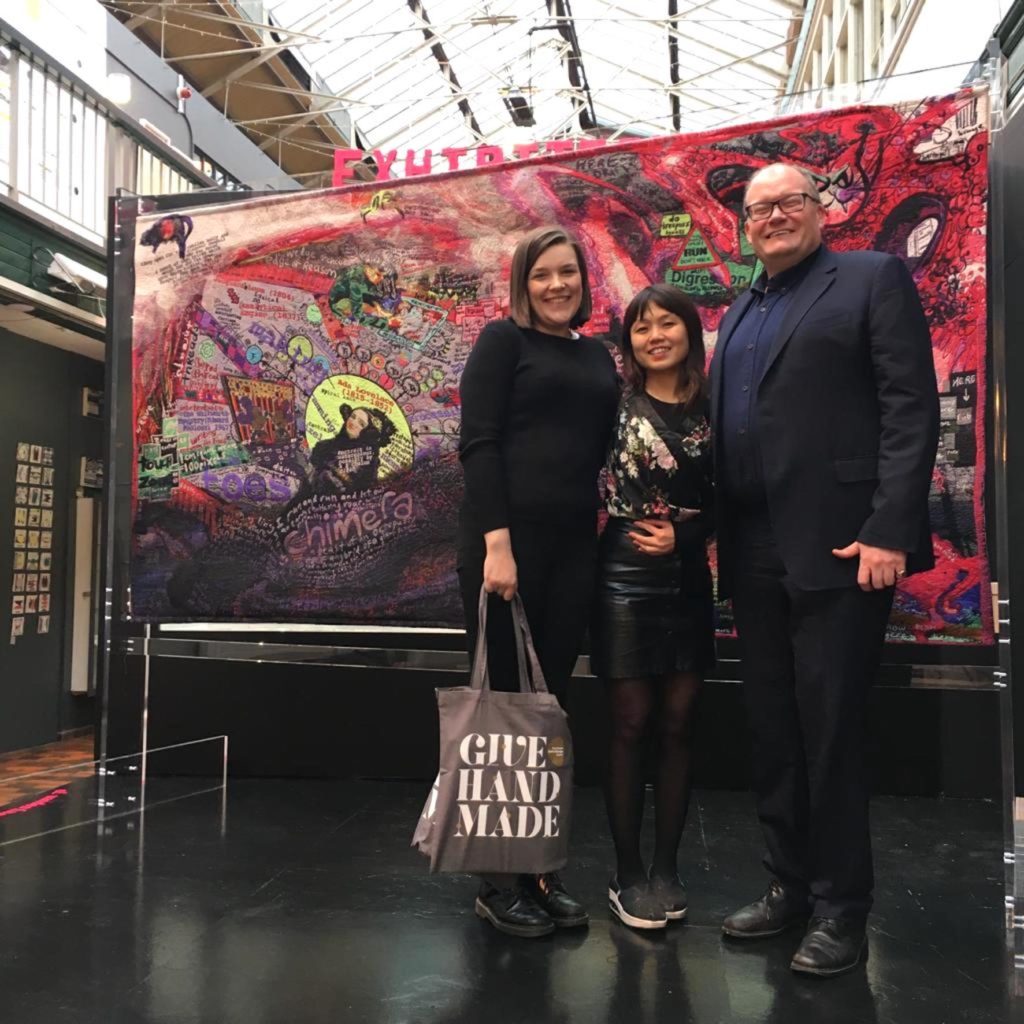
Laura Feltham of the Centre, with Kai and Dr Darren Henley OBE, CEO of Arts Council England, pictured 31 January 2020 in front of the tapestry of #MagicCarpet (Kai Syng Tan 2017-2019).
- Given the COVID-19 pandemic, #MagicCarpet: Of wandering and weaving, of digits and the digital, of craft and craftiness A tapestry by Kai Syng Tan show at the Manchester Craft and Design Centre was shut ahead of its 4th April date, and the panel discussion cancelled. The panel was to have featured myself, with Creative Director at the Crafts Council Natalie Melton, and Assistant Curator of Textiles and Wallpaper at the Whitworth Gallery, Uthra Rajgopal, and chaired by the Centre director Kate Day.
- The Centre has however honoured the commission. Thus, as of March 2020, I have redirected some of the funding. It is nothing to shout about, but, as Sainsbury’s clarifies, every penny helps. Small efforts add to larger efforts and/or can inspire yet other efforts. They include donations to the NHS (for staff access to PPE), the Guardian (for its no-paywall, in-depth coverages) and the Pankhurst Trust (which protects women from escalation of domestic violence during this time); setting up the Craftiness Against COVID-19 haiku contest for emerging.
9. Cabinet and Parliament expert databases
- I responded to UK Parliament’s call for COVID-19 Outbreak Expert Database, as well as a separate call by the UK Government Cabinet Office’s Open Innovation Team for a similar databased. I am offering to help strategise ways to solve problems creatively, share new approaches/responses to combat negative impact of social distancing, self-isolation, and/or to work on public engagement through art and creativity to educate, persuade, fight the virus, fake news and bigotry, and give communities agency. Working with others will allow me to learn and grow too
- This draws on some of my existing pro bono work, including as Creative and Cultural Consultant of UK Adult ADHD Network (network for mental health professionals), Advisor to PsychART (linking psychiatry, creativity and the arts, funded by Royal College of Psychiatry), trustee of Music in Detention. (charity to support detained migrants through the arts), as Co-Founder & Co-Manager, Neurodiversity In/& Creative Network.
- I will also join a webinar “Parliament for COVID-19 outbreak experts” and others to find ways to contribute.
- None of these calls have explicitly asked for people from the creative arts, but you can’t be heard if you are not in the same room, or only lock yourself in ‘safe spaces’ and echo chambers with like-minded. While in these new same rooms/sites, you can and must still maintain autonomy of thought. As you introduce/share/assert/defend/counter, you must also allow yourself to be vulnerable/porous and step out of your comfort zone, to learn, to be challenged. When/if you have a platform, fucking use it. If you’re not allowed into the space, you knock/mock harder, kick the door down and slip way in. Once your toes are through the door, also help others to move in from the sides/outside – and don’t ever become a gate keeper, give way/lean out/co-chair. Power in itself is abstract/vacant/meaningful. Artful leadership is all about empowering others.
10. Developing Bob and Roberta Smith’s ideas around art as a human right and artists are key workers, and those in my ongoing conversation with friend, artist and Director of Fermynwoods Contemporary Art James Steventon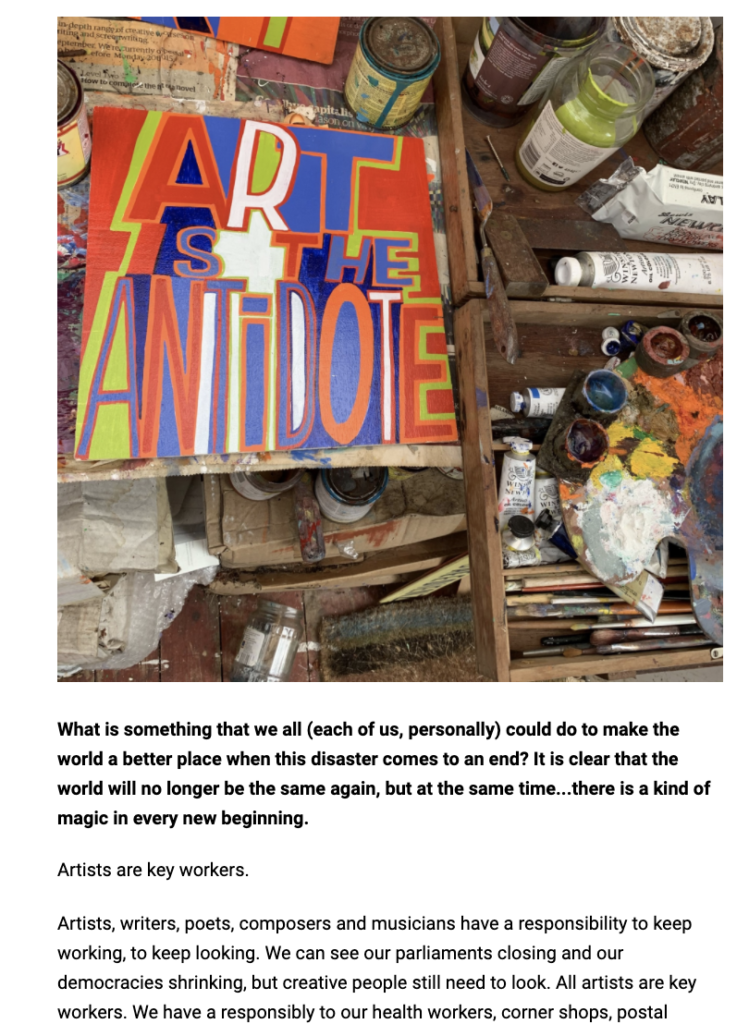
- The above is a screenshot from brilliant 7 April 2020 Bob and Roberta Smith interview in which they stated: ‘Art is a human right. Artists are #keyworkers. Making art is […] about organising, drawing and putting things together while thinking about the future. Paul Klee said art was the “life force”. So make art, folks! We will get through this with art’
- Drawing on this and dialogues with James, I am working on a 1500 word statement to respond to the Parliament’s call for evidence on how COVID-19 is affecting human rights, by relating art and art higher education as human rights.
- I will further develop this for a UK Research and Innovation (UKRI) research open call for research & innovation ideas to address COVID-19. I wish to propose micro or symbolic systems that will allow a re-distribution of power and/or funding especially for self-employed and early-career researcher-colleagues. This will draw further on my artistic and curatorial work since 2009 on running as a creative intervention. Age make some mellow, or sell out and swop to the other side of the political spectrum. Yet, others may become more troubled, grieved, ridden once again with a weltschermz or world-weariness that had weighted one when a teenager incandescent with injustice (not just by the obvious culprits but the disingenuous self-proclaimed ‘allies’). I have also been inspired by the radical yet witty work of my colleague the wonderful artist Cesar Cornejo.
12. Performance research seminar 29 April 2020
- Click on image for the 2020 April version of Exceptional Talent, the State of Fun & Islands of After Death (Kai Syng Tan 2018).
- This version is a recording of a seminar for the Performance Research Group, School of Arts and Media, University of Salford, which took place online 29 April 2020. It was organised, led and hosted by Dr Richard Talbot. We were. joined by Clare Neylon, a film and performance maker and a lecturer in Media and Performance, who explored historical media reaction to women cyclists.
- This was first performed as a keynote-lecture at Peter Scott at the Inaugural Art & Mobilities Symposium 2018.
13. Other efforts
Other efforts have included:
- Giving evidence to Higher Education Equal Opportunities Network (HEEON) on how the disruptions may be affecting neurodiverse people;
- Running again (or rather shuffling my body left/right/forwards/backwards limped-ly but hey, no one is watching), and during these
runsshuffling, checking if the local arts premises are OK. I have also contacted the local cat cafe and volunteered to clean the litter (and be in the presence of their great majesties) but the cafe have turned down my offer (have they their own armies of crazy cat ladies?). During the shuffling, I also visit friends who are key workers and give them face masks I have been given, get snacks for and say hello to local homeless friends, and otherwise pretend to be playing a game with the city as my playground and making sharp turns whenever I run into another person. Remember, always stay at least 2 metres apart!! - Helping out with tutorials at Art, Performance and Theory and Fine Art, and initiating regular meetings with colleagues who lead on postgraduate programmes to strategise resilient ways forward that are more sustainable (environmentally and in terms of mental health) for students (including international, disabled) and staff. The emphasis is on creating a system that complement and support existing ones but also cuts across divisions/silos, to emphasis collaboration across disciplines/hierarchy, embedding good/better practice, and making use of fellow colleagues as working group/panel of experts/critical friends to help solve problems, think aloud etc.
- Comforting colleagues who are troubled, including by offering to cry together through Skype.
14. UN Call
I did not respond to UN call for creatives to help stop COVID-19 (kindness contagion strand) as it refuses to guarantee crediting (and will not pay honoraria). That is not kind, and not good practice, while artists and creatives are meant to be kind and donate time and effort.
15. Can I help?
Do get in touch if I can help in any other way, or if you’re keen to chat/cry.
